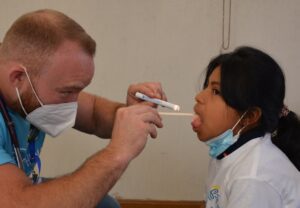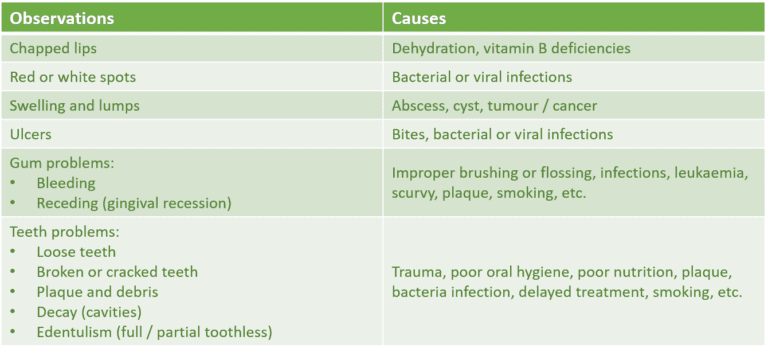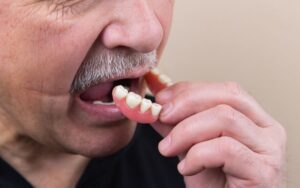Page Contents
What does oral screening check for?
Basic oral screening is usually performed by a dental nurse or dental hygienist. While advanced procedures are carried out by a dentist.
For preliminary assessment, a nurse will use OHAT (oral health assessment tool) and follow through a routine visual check on your:
- Lips
- Inner cheeks
- Tongue
- Floor of the mouth
- Soft and hard palate
- Gums
- Teeth

What are the common observations and possible complications?
OHAT allows nurse to pick up different observations. Subsequently, derive potential causes for further investigation and necessary intervention (Figure 1).


What solutions are available from oral screening?
There are 3 typical outcomes from an oral screening.
- Good oral health, no observations.
- Dental hygienist would give advice on general oral care and encourage regular screening.
- Require medications or dental treatments such as scaling, filling, extraction, surgery, etc.
- Refer to a dentist for further interventions.
- Require dentures.
- Dentist will make measurements and dental impressions to custom-made dentures.


To-do and Not-to-do
Things that cause poor oral health:
- Smoking causes gum diseases and plaque formation.
- Alcohol can increase tooth decay, gum diseases, and damage the enamel.
- Diabetes leads to gum diseases and bleeding, mouth infections, tooth decay, ulcers, and bad breath.
- Acid from coffee can weaken your enamel and stain your teeth.
- Sugary foods and drinks form plaques that promote bacterial growth, and bacterial will release acid to break down enamel.
- Poor dental hygiene habits, for example, not brushing and flossing regularly.
- Some medications may reduce the saliva production, which leads to increased plaque, tooth decay, gum diseases, mouth sores, and yeast infection.
- Frequent acid reflux and vomiting can also leave acid in your mouth.
Things to do for good oral health:
- Regular teeth cleaning and maintenance
- Brushing helps to remove food that stuck on the surfaces and gums.
- Flossing removes food that is trapped in between teeth.
- Using fluoride mouth rinse or fluoride toothpaste can strengthen your enamel.
- Regular self-check on lips, tongue, inner cheeks, floor of mouth, palate, gums, and teeth. If notice any issue that last for 1-2 weeks, seek professional help.
- Visit a dentist for checking and scaling every year.
Conclusion
When you age, you will start experiencing tooth loss. Receding gums, decay, wobbly teeth, and deterioration of the jawbone are some of the common reasons. In order for you to continue eating, dentist will prescribe dentures.
A study from King’s College London reports that elderly who wear dentures tend to avoid healthy and fibrous foods that are rather difficult to chew. This has led to a more serious health problem, malnutrition. As you would have guessed correctly, subsequent complications may surface over time, such as frailty, muscle weakness, low immunity, slow recovery, etc.
To prevent all these from happening, it is important that you take good care of your teeth and gums now. Maintain good oral health and visit the dentist for an annual check-up.
